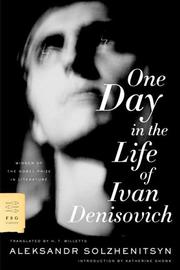

Shukhov must exert a great effort to preserve self-respect throughout the day and still he has to endure any consequences. These liberating acts can be as simple as removing one's hat at a meal or abstaining from eating others' leftover bowls. Although the camp's system seeks to obliterate any expressions or attempts towards moral and ethical actions, Shukhov and few of his fellow prisoners maintain their dignity through unnoticed acts and rituals. In spite of the harsh conditions of the labor camp, Shukhov, Solzhenitsyn's protagonist, lived to tell the tale of how at least his own humanity survived one single day. While based on Solzhenitsyn's own experiences, One Day in the Life of Ivan Denisovich chronicles the effects of the Stalinist system upon the individual worker's day and how these effects are set to rob the prisoner of any meaning in life and in due course negate his humanity. Solzhenitsyn's book was published in 1962 at a time when Khrushchev, then premier of the Soviet Union, was dynamically seeking to condemn the practices of his predecessor. In portraying the bits and pieces of a prisoner's life in a forced labor camp, a life the author himself endured during an eight-year sentence under Stalin's rule, Solzhenitsyn undertakes to demonstrate the camp's effects on a prisoner's humanity. Solzhenitsyn's One Day in the life of Ivan Denisovich is a demonstration of how, in a restricted environment in which every move and word is proscribed and monitored, a prisoner can assert his free will and thus maintain his humanity. The Endurance of Humanity in Solzhenitsyn's One Day in the Life of Ivan Denisovich


 0 kommentar(er)
0 kommentar(er)
